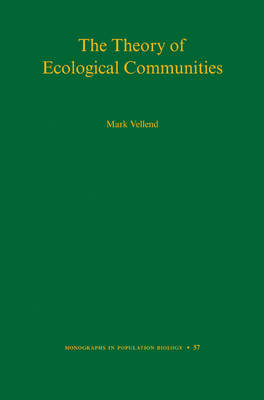
Stock image for illustration purposes only - book cover, edition or condition may vary.
The Theory of Ecological Communities (MPB-57)
Mark Vellend
€ 67.13
FREE Delivery in Ireland
Description for The Theory of Ecological Communities (MPB-57)
Hardback. Series: Monographs in Population Biology. Num Pages: 248 pages, 2 halftones. 56 line illus. 9 tables. BIC Classification: PSAF; RNCB. Category: (P) Professional & Vocational; (U) Tertiary Education (US: College). Dimension: 164 x 242 x 21. Weight in Grams: 482.
A plethora of different theories, models, and concepts make up the field of community ecology. Amid this vast body of work, is it possible to build one general theory of ecological communities? What other scientific areas might serve as a guiding framework? As it turns out, the core focus of community ecology--understanding patterns of diversity and composition of biological variants across space and time--is shared by evolutionary biology and its very coherent conceptual framework, population genetics theory. The Theory of Ecological Communities takes this as a starting point to pull together community ecology's various perspectives into a more unified whole. Mark Vellend builds a theory of ecological communities based on four overarching processes: selection among species, drift, dispersal, and speciation. These are analogues of the four central processes in population genetics theory--selection within species, drift, gene flow, and mutation--and together they subsume almost all of the many dozens of more specific models built to describe the dynamics of communities of interacting species. The result is a theory that allows the effects of many low-level processes, such as competition, facilitation, predation, disturbance, stress, succession, colonization, and local extinction to be understood as the underpinnings of high-level processes with widely applicable consequences for ecological communities. Reframing the numerous existing ideas in community ecology, The Theory of Ecological Communities provides a new way for thinking about biological composition and diversity.
Product Details
Publisher
Princeton University Press
Format
Hardback
Publication date
2016
Series
Monographs in Population Biology
Condition
New
Number of Pages
248
Place of Publication
New Jersey, United States
ISBN
9780691164847
SKU
V9780691164847
Shipping Time
Usually ships in 15 to 20 working days
Ref
99-15
About Mark Vellend
Mark Vellend is professor of biology at the Universite de Sherbrooke. He is a 2015 recipient of an E. W. R. Steacie Fellowship from the Natural Sciences and Engineering Research Council of Canada.
Reviews for The Theory of Ecological Communities (MPB-57)
In 1986, Thomas W. Schoener wrote a thought-provoking book chapter describing ecological communities along five organismal and five environmental axes. It was thought-provoking in the sense that Schoener attempted to unify community ecology using a minimal set of variables at a time when ecologists were doubtful of any unifying principle in community ecology. After three decades of Schoener's chapter, community ecologists are still divided about whether there could be a general theory of community... Mark Vellend elegantly attempts to bridge this divide by introducing the theory of high-level processes in ecological communities in his Princeton Population Monograph entitled The Theory of Ecological Communities.
Madhav P. Thakur, Trends in Ecology and Evolution Vellend (biology, Univ. de Sherbrooke, Canada) provides a useful historical account of the wide variety of methods used in the field to lay the foundation for his proposed resolution of the resulting 'mess.' The book is well written, profusely referenced, and a worthy addition to the distinguished 'Monographs in Population Biology' series from Princeton University Press.
Choice
Madhav P. Thakur, Trends in Ecology and Evolution Vellend (biology, Univ. de Sherbrooke, Canada) provides a useful historical account of the wide variety of methods used in the field to lay the foundation for his proposed resolution of the resulting 'mess.' The book is well written, profusely referenced, and a worthy addition to the distinguished 'Monographs in Population Biology' series from Princeton University Press.
Choice
